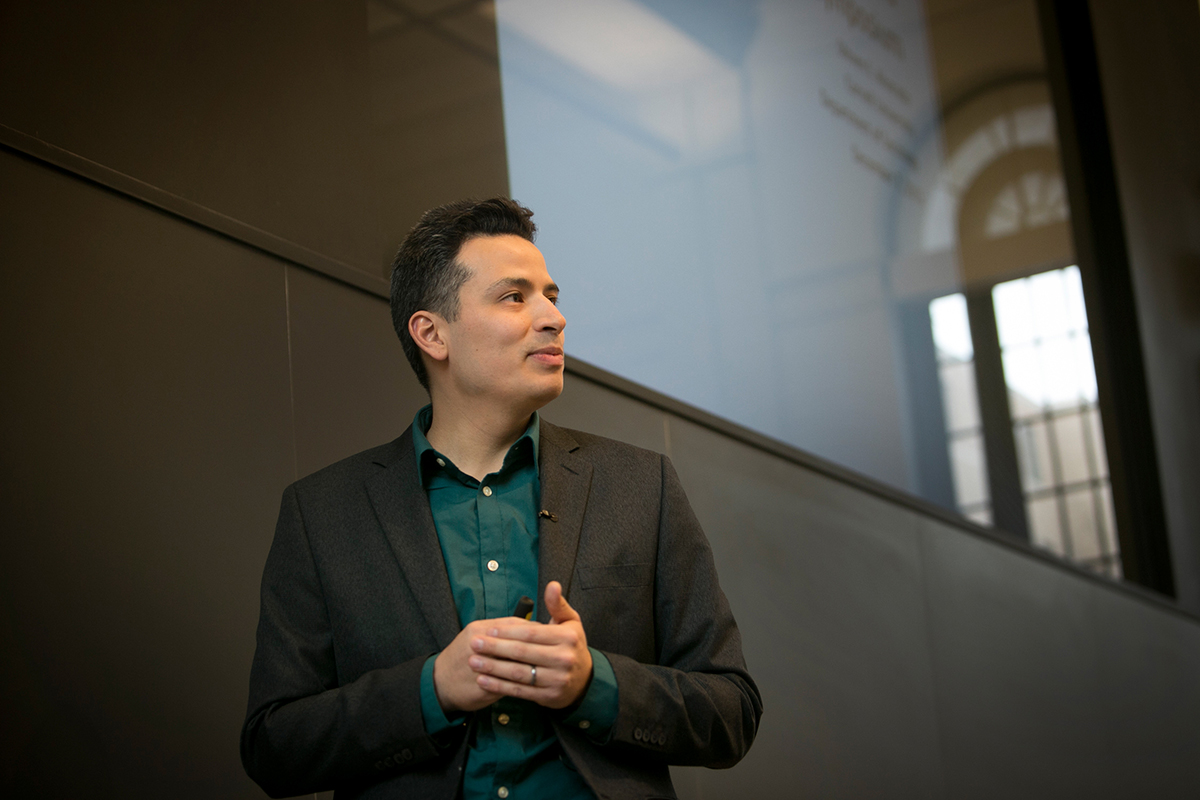Scholar describes pitfalls minorities face in academia
By Robert Johnson

For scholars from underrepresented minority groups, the concept of selection in academia and professional education is inseparable from historic and contemporary realities of exclusion and marginalization.
Explaining the complexities of this selection was the main theme of the Fall Diversity in Scholarship and Engagement Symposium keynote speech, delivered by sociologist Steven E. Alvarado, Dec. 7 in Warren Hall.
Alvarado began his speech by illustrating the relative absence of minority students in higher education, evidenced by statistics showing that levels of degree attainment, from the high school level onward, decline sharply among Native American, black and Hispanic/Latino students when compared to that of their white and Asian peers.
“We are increasingly representing a highly selective sub-population of students overall in the United States,“ he said.
For underrepresented minorities, undergraduate science and engineering degree attainment has been increasing over the past 20 years, but remains far below numbers for white students. According to Alvarado, these disparities relate directly to disparities in employment in STEM sectors. The percentage of U.S. scientists and engineers who are black and Latino are 4.8 percent and 6 percent, respectively.
Programs like McNair Scholars and those offered by the Office of Academic Diversity Initiatives aim to address issues of underrepresentation not only at the bachelor’s degree level, but also at the doctorate level, Alvarado said.
Drawing from his experiences as a rising Latino student researcher at the University of California, Berkeley, and doctoral student at the University of Wisconsin-Madison, Alvarado explained some of the difficulties experienced by underrepresented students – specifically the idea of imposter syndrome, or the feeling of not belonging.
“You can be a first generation student, you can be a low-income student, but for black and Latino and women scholars you cannot hide away from this feeling of not belonging when you look around you and realize that you might be the only one in the graduate program in the past four years that looks the way you do,” he said.
Alvarado said this often leads to feeling the need to always be at your best and better than everyone else, just to feel like you belong.
Focusing on his research helped him to stay grounded and centered on the objectives that he set for himself, Alvarado said. He advised aspiring scholars to pursue topics and ask questions that are actually relevant to their interests, as this will go a long way to keeping them engaged in their work.
“Creating your own time” was also something Alvarado recommended. He suggested this could be done through securing fellowships and grants in lieu of distracting teaching assistant or research assistant obligations that lack relevance to the scholar’s interests. However, Alvarado stressed that scholars should take advantage of any relevant opportunities when they arise, as these are important for building relationships and gaining experience.
“It is so important to try to get over your qualms and fears to ask your peers for help,” he said. “This is very simple, but very important. Oftentimes that involves getting into very sensitive and sort of confrontational topics.”
Alvarado warned that this may be difficult at times, given the reality that many peers and professors surrounding scholars from underrepresented groups often have divergent perspectives and world views. But the inability to ask for help often derails underrepresented students from achieving success.
Finally, Alvarado said scholars of minority backgrounds should keep in mind a sense of responsibility, both to themselves and to the communities they represent, as motivation for success.
“We represent a minority of minorities: we are selected. We have a responsibility to our communities to use ourselves to propel our communities forward,” he concluded.
The following students presented research at the event:
- Misha Inniss-Thompson '16, “Reflection as Resource: Mitigating the Impact of Vicarious Discrimination”
- Enrique Diaz Barriocanal '16, “Modeling Evacuation Decisions through Survival Regressions”
- Brian Calderon '16, “Growth optimization 2D Boron Nitride Films”
- Abigail Shilvock '18, “Examining Interferon Signaling in ADAR1 Deficient Human Cells”
- Jose Rios '16, “Poly(acrylic acid)-Poly(ethylene glycol) Microgels for Protein Delivery”
- “Sherry” Xing Zhang '17, “Maternal Incarceration, Childhood Context, and Children's Risky Behaviors in Young Adulthood”
- Shane Michtavy '18, “Integration of Software for diffraction and a Potentiostat”
- Fredrick Blaisdell '16, “Characterization of perirenal adipose tissue in intrauterine growth restricted lambs”
- Trenel Francis '16, “Hooking Up Now, But Settling Down Later: Exploring Emerging Adults' Future Relationship Expectations”
- Beatriz Barros '17, “The Giant Awoke? Social Protests and Electoral Change in Brazil, 2013-2014”
- Amatunoor Frederickson '17, “The Racialization of Muslim Americans in the Post-9/11 World”
- “Esther” Saebyoeokbyeol Kim '17, “Sibling Relationships Catalyze Children’s Psychosocial and Cognitive Development”
- “Erial” Erchen Zheng '18, “The Rehabilitation of Robespierre? How the Historiography of the Early 20th Century Influenced the Perception of ‘The Incorruptible’”
- Priscilla Cancar '18. “Alternative Technology for Dyslexic Students”
Alexandra Hoeger ’18, “Cultural Cathexis: Explaining Kanye West's “POWER” Through Freud and the War on Terror”
- Summer Lopez Colorado '18, “Opportunity Structures for Undergraduate Latin@s in Selective Institutions: Academic Engagement and Quality of Campus Climate”
- Jesse Sanchez '18, “A Silent Dissonance: LGBT Rights and Geopolitics in Maidan and Post-Maidan Ukraine”
- Mane Mehrabyan '17, “Design in France”
- Rigoberto Hernandez '17, “Interdisciplinary Collaboration: The Role of Diversity in STEM Innovation”
Robert Johnson ’17 is a writer intern for the Cornell Chronicle.
Media Contact
Get Cornell news delivered right to your inbox.
Subscribe